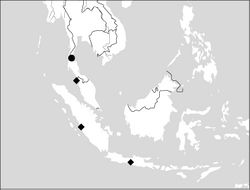Metallanchista perlaeta
| Notice: | This page is derived from the original publication listed below, whose author(s) should always be credited. Further contributors may edit and improve the content of this page and, consequently, need to be credited as well (see page history). Any assessment of factual correctness requires a careful review of the original article as well as of subsequent contributions.
If you are uncertain whether your planned contribution is correct or not, we suggest that you use the associated discussion page instead of editing the page directly. This page should be cited as follows (rationale):
Citation formats to copy and paste
BibTeX: @article{Shi2013ZooKeys284, RIS/ Endnote: TY - JOUR Wikipedia/ Citizendium: <ref name="Shi2013ZooKeys284">{{Citation See also the citation download page at the journal. |
Ordo: Coleoptera
Familia: Carabidae
Genus: Metallanchista
Name
Metallanchista perlaeta (Kirschenhofer, 1994) comb. n. – Wikispecies link – Pensoft Profile
- Metallanchista perlaeta Kirschenhofer 1994[1]: 1025 (original: Allocota; type locality: Langkawi Isld. (Malaysia); holotype deposited in NHMW).
Notes on types
The holotype, a female, came from Langkawi Island. We have not examined it.
Non-type material examined
(Total 2 females from Indonesia) 1 female (CRS), “Sumatra C., Padang 3. 97, Panjang”[Fig. 9]. 1 female (NHML), “Java”; “Bowring., 63 47*”[Fig. 10].
Diagnosis
Elytral color various, metallic violaceous, green, or cupreous, but always with distinct bluish color along lateral margins; pronotal width 1.50 times length, lateral margins completely rounded in middle, front angles with moderately long setae; elytral intervals hardly convex. This species is close to Metallanchista laticollis sp. n., but can be distinguished from it by different color and pronotal shape.
Description
Body length 9.1–9.9 mm; head nearly black, with luster, antennae dark brown; mouthparts reddish brown, apices of terminal palpomeres yellow; pronotum black, with luster, slightly bluish in lateral expansion; elytra strongly metallic, disc violaceous, green, or cupreous, sometimes with basal and lateral areas bluish, but at least lateral margins distinctly bluish; epipleurae yellowish brown with metallic blue; ventral side dark brown to black, slightly lustrous; legs black, tarsomeres brown. Head glabrous, without microsculpture or punctures. Pronotum rounded, widest slightly before middle; lateral explanate areas very wide, flat, with a few punctures; ratio PW/PL 1.50; pronotal base briefly but distinctly lobed; disc moderately convex, microsculpture indistinct, without punctures or pubescence; front angles with some moderately long setae; lateral margins completely rounded in middle, strongly sinuate before hind angles; hind angles slightly acute, distinctly but slightly projected, with a few accessory setae; basal foveae shallow, with a few punctures; median line shallow, not reaching to apical or basal margin. Elytra with striae barely sulcate, composed of fine punctures, but slightly deepened in middle of 6th stria; intervals hardly convex, without punctures or microsculpture; 3rd interval with two setigerous pores, basal one placed at basal one-third approximately, adjacent to 3rd stria, apical one placed at apical one-eighth approximately, adjacent to 2nd stria; 5th interval with one setigerous pore near base. Male genitalia unknown. Female genitalia with apical segment of ovipositor slender and straight, without setae, length about four times basal width; widest at base, gradually narrowed to apex, apex sharp; inner and outer margin nearly straight; extended part on apex slightly sclerotized, very short. Spermathecal characters not studied.
Distribution
(Map 4). Malay Peninsula, Sumatra, Java.
Geographical variation
So far only the three females of this species from different localities are known to us. They are different in color from each other, probably representing geographical variation. The holotype from Malay Peninsula has the elytra cupreous, apex violaceous, lateral margin slightly blue (by original description). The second female is from Sumatra and has the elytra violaceous on most areas, laterally with bluish band occupying 7th to 9th intervals, and the two bands joined at base. The last one is from Java and has elytra that are fully metallic green, but slightly bluish along lateral margin. More specimens, especially males, are needed for further study.
Taxon Treatment
- Shi, H; Zhou, H; Liang, H; 2013: Taxonomic synopsis of the subtribe Physoderina (Coleoptera, Carabidae, Lebiini), with species revisions of eight genera ZooKeys, 284: 1-129. doi
Other References
- ↑ Kirschenhofer E (1994) Neue und wenig bekannte Carabidae aus der palaarktischen und orientalischen Region (Col., Carabidae, Lebiinae, Odacanthinae, Brachininae, Panagaeinae). Linzer Biologische Beiträge 26 (2): 999-1067.
Images
|

